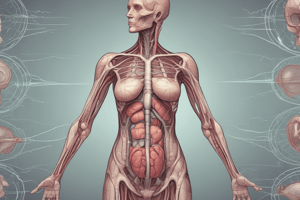Podcast
Questions and Answers
Flashcards are hidden until you start studying
Study Notes
Structure and Function
- The male accessory glands are a group of organs that produce and secrete fluids that make up semen, which nourish and transport sperm during ejaculation.
- The main male accessory glands are:
- Seminal vesicles: produce 60% of semen, including fructose, which provides energy for sperm.
- Prostate gland: produces 30% of semen, including enzymes that help break down sperm membranes.
- Urethral glands (also known as Cowper's glands): produce mucus that helps lubricate the urethra.
- Bulbourethral glands (also known as Cowper's glands): produce mucus that helps lubricate the urethra.
Functions of Semen
- Provides a medium for sperm to swim in
- Nourishes sperm with nutrients and energy
- Helps to buffer the acidity of the vagina
- Lubricates the urethra during ejaculation
Clinical Significance
- Infections or inflammation of the male accessory glands can lead to conditions such as prostatitis, epididymitis, or seminal vesiculitis.
- Benign prostatic hyperplasia (BPH) is a common condition in older men that can lead to urinary symptoms.
- Cancer can occur in the prostate gland, seminal vesicles, or other male accessory glands.
Structure and Function
- The male accessory glands produce and secrete fluids that make up semen, which nourish and transport sperm during ejaculation.
- The main male accessory glands are seminal vesicles, prostate gland, urethral glands, and bulbourethral glands.
Functions of Seminal Vesicles
- Produce 60% of semen, including fructose, which provides energy for sperm.
Functions of Prostate Gland
- Produces 30% of semen, including enzymes that help break down sperm membranes.
Functions of Urethral and Bulbourethral Glands
- Produce mucus that helps lubricate the urethra.
Functions of Semen
- Provides a medium for sperm to swim in.
- Nourishes sperm with nutrients and energy.
- Helps to buffer the acidity of the vagina.
- Lubricates the urethra during ejaculation.
Clinical Significance
- Infections or inflammation of the male accessory glands can lead to prostatitis, epididymitis, or seminal vesiculitis.
- Benign prostatic hyperplasia (BPH) is a common condition in older men that can lead to urinary symptoms.
- Cancer can occur in the prostate gland, seminal vesicles, or other male accessory glands.
Studying That Suits You
Use AI to generate personalized quizzes and flashcards to suit your learning preferences.




